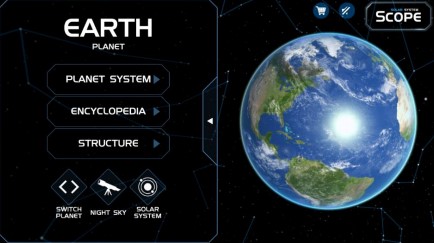
Discovery Learning with the Solar System Scope Application to Enhance Learning in Middle School Students
Abstract
Full Text:
DOWNLOAD PDFReferences
Afriani, T., Agustin, R. R., & Eliyawati, E. (2019). The Effect of Guided Inquiry Laboratory Activity with Video Embedded on Students’ Understanding and Motivation in Learning Light and Optics. Journal of Science Learning, 2(4), 79-84.
Andrews, J. D. W. (1984). Discovery and Expository Learning Compared: Their Effects on Independent and Dependent Students. The Journal of Educational Research, 78(2), 80–89.
Balım, A. G. (2009). The Effects of Discovery Learning on Students’ Success and Inquiry Learning Skills. Eurasian Journal of Educational Research (EJER), (35), 1-20.
Baharudin, R., & Luster, T. (1998). Factors related to the quality of the home environment and children’s achievement. Journal of Family Issues, 19(4), 375-403.
Bruner, J. S. (1961). The act of discovery. Harvard Educational Review.
Dalgarno, B., Kennedy, G., & Bennett, S. (2014). The impact of students’ exploration strategies on discovery learning using computer-based simulations. Educational Media International, 51(4), 310–329.
Dede, C. (2000). Emerging influences of information technology on school curriculum. Journal of Curriculum Studies, 32(2), 281-303.
De Jong, T., & Van Joolingen, W. R. (1998). Scientific discovery learning with computer simulations of conceptual domains. Review of educational research, 68(2), 179-201.
Fraenkel, J. R., Wallen, N. E., & Hyun, H. H. (2011). Validity and reliability, how to design and evaluate research in science education. Mc Graw–Hill Companies.
Furness, T. A., Winn, W., & Yu, R. (1997). Global Change, VR And Learning, A Report For The NSF Of Workshops, The Impact Of Three Dimensional Immersive VE On Modern Pedagogy. NSF.
Furqani, D., Feranie, S., & Winarno, N. (2018). The Effect of Predict-Observe-Explain (POE) Strategy on Students’ Conceptual Mastery and Critical Thinking in Learning Vibration and Wave. Journal of Science Learning, 2(1), 1-8.
Gilbert, J. K. (2008). Visualization: An emergent field of practice and inquiry in science education. In Visualization: Theory and practice in science education (pp. 3-24). Springer.
Goni, U. (2015). Gender Difference in Students’ Academic Performance in Colleges of Education in Borno State, Nigeria: Implications for Counselling. Journal of Education and Practice, 6(32), 107-114.
Großmann, N., & Wilde, M. (2019). Experimentation in biology lessons: guided discovery through incremental scaffolds. International Journal of Science Education, 41(6), 759-781.
Güzel, H. (2010). Profiles of University Students Based on Multiple Intelligence Theory and its Effect on Their Success in Physics Lecture. World Applied Sciences Journal, 10(6), 665-674.
Hake, R. R. (1998). Interactive-engagement versus traditional methods: A six-thousand-student survey of mechanics tests data for introductory physics courses. American Journal of Physics, 66(1), 64-74.
Joyce, B., Weil, M., & Showers, B. (1992). Models of Teaching (4th ed.). Ally and Bacon.
Mikropoulos, T. A., & Natsis, A. (2011). Educational virtual environments: A ten-year review of empirical research (1999–2009). Computers & Education, 56(3), 769-780.
Mostafaee, L. (2015). The Impact Of Form Focused Discovery Approach On EFL Learners’ Speaking Ability. Modern Journal of Language Teaching Methods, 5(1), 10-19.
Mukherjee, A. (2015). Effective Use of Discovery Learning to Improve Understanding of Factors That Affect Quality. Journal of Education for Business, 90(8), 413–419.
Ornek, F., Robinson, W. R., & Haugan, M. R. (2007). What Makes Physics Difficult?. Science Education International, 18(3), 165-172.
Persson, J. R., & Eriksson, U. (2016). Planetarium Software In The Classroom. Physics Education, 51(2), 025004.
Pillow, B. (2008). A comparison of academic performance in A- level economics between two years. International Review of Economics Education, 2(1), 8-24.
Rivers, R. H., & Vockell, E. (1987). Computer simulations to stimulate scientific problem-solving. Journal of Research in Science Teaching, 24(5), 403-415.
Prima, E. C., Putri, C. L., & Sudargo, F. (2017). Applying Pre and Post Role-Plays supported by Stellarium Virtual Observatory to Improve Students’ Understanding on Learning Solar System. Journal of Science Learning, 1(1), 1-7.
Saab, N., van Joolingen, W. R., & van Hout-Wolters, B. H. A. M. (2006). Supporting Communication in a Collaborative Discovery Learning Environment: the Effect of Instruction. Instructional Science, 35(1), 73–98.
Saab, N., van Joolingen, W. R., & van Hout‐Wolters, B. H. A. M. (2009). The relation of learners’ motivation with the process of collaborative scientific discovery learning. Educational Studies, 35(2), 205–222.
Sani, A., Rochintaniawati, D., & Winarno, N. (2019). Using Brain-Based Learning to Promote Students’ Concept Mastery in Learning Electric Circuit. Journal of Science Learning, 2(2), 42-49.
Singer, R. N., & Pease, D. (1976). A comparison of discovery learning and guided instructional strategies on motor skill learning, retention, and transfer. Research Quarterly. American Alliance for Health, Physical Education and Recreation, 47(4), 788-796.
Vania, P. F., Setiawan, W., & Wijaya, A. F. C. (2018). Edmodo as Web-Based Learning to Improve Student’s Cognitive and Motivation in Learning Thermal Physics. Journal of Science Learning, 1(3), 110-115.
Winarno, N., Rusdiana, D., Susilowati, E., & Afifah, R. M. A. (2020). Implementation of integrated science curriculum: a critical review of the literature. Journal for the Education of Gifted Young Scientists, 8(2), 795-817.
Westwood, P. S. (2008). What teachers need to know about teaching methods. Aust Council for Ed Research.
Yu, K. C., Sahami, K., Sahami, V., & Sessions, L. C. (2015). Using a Digital Planetarium for Teaching Seasons to Undergraduates. Journal of Astronomy & Earth Sciences Education, 2(1), 33-50.
Yu, K. C., Sahami, K., Denn, G., Sahami, V., & Sessions, L. C. (2016). Immersive Planetarium Visualizations for Teaching Solar System Moon Concepts to Undergraduates. Journal of Astronomy & Earth Sciences Education, 3(2), 93-110.
DOI: https://doi.org/10.17509/jsl.v3i3.23503
Refbacks
- There are currently no refbacks.
Copyright (c) 2020 Atika Zahara

This work is licensed under a Creative Commons Attribution-ShareAlike 4.0 International License.


Jl. Dr. Setiabudhi 229 Bandung 40154, West Java, Indonesia










